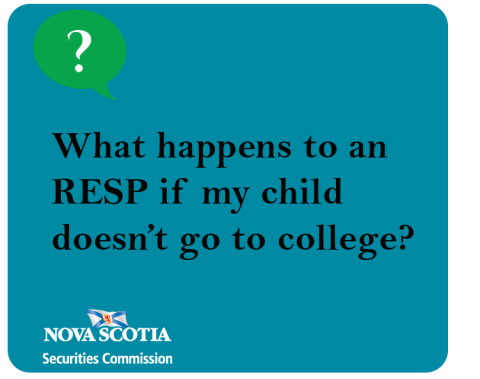Submitted by nsscadmin on

Last week we talked about RESPs and that led a reader to wondering what happens to the money in an RESP if their child doesn’t go to college or university? It’s definitely a possibility. Some parents start funding their RESP before their child is walking. Who knows what they might be doing 18 years down the road?
If this situation does arise then you could have four options to consider:
1. Keep the RESP open
2. Transfer the money to another beneficiary
3. Transfer the money to an RRSP
4. Close the RESP
Let’s take a closer look at each option and what it means for you, your child and your money.
1. Keep the RESP open
This is the simplest option, as you’re basically continuing on. Your child may not be going to school today or tomorrow, but things can change and down the road they may eventually decide to go to school. An individual or family RESP can stay open for up to 36 years leaving you plenty of time to keep your money invested in case something changes. One thing to remember, group RESPs have different rules and regulations, so check to see if this option is available to you. It may not be.
2. Transfer the money to another beneficiary
If you have an individual RESP you can name another beneficiary. However, any money earned through the Canada Education Savings Grant must be returned to the government.
If you have a family RESP this is no issue. Since it’s a family plan you can use the money for any child you wish.
If you have a group RESP you’ll have to check with the rules and regulations of your plan to see if they allow transferring money to another beneficiary.
3. Transfer the money to an RRSP
You can transfer up to $50,000 from your RESP to an RRSP, but there are some rules to follow. The RESP has to have been open for at least 10 years. You must be a Canadian resident. You must have enough contribution room in your RRSP.
Again, with group RESP plans there may be other rules and regulations you must follow if you are able to transfer your money to an RRSP.
4. Close the plan
This sounds pretty straight forward, but there are rules around what happens to the money. Your contributions are returned to you tax-free. Any federal or provincial grants you obtained through the RESP must be returned. Money earned through programs like the Canada Education Savings Grant can only be used for post-secondary education.
If you have investment earnings what happens to your money depends on what kind of plan you have. Under an individual or family plan you can take out your investment earnings if the plan has been open for at least 10 years and the beneficiaries have not attended a post-secondary institution by the time they are 31 years old. However, tax will have to be paid on the investment earnings withdrawn from the plan.
Under a group RESP plan you do not get back any investment earnings. These stay in the plan and are shared among the remaining plan members. Some group plans may vary, so be sure to check the rules and regulations of any plan before joining.
With any RESP make sure you know all the rules and regulations you must follow before investing your money. Ask as many questions you need to be assured you know what you are allowed to do and what is not allowed under your plan. Doing your due diligence is the best way to avoid any problems down the road.
